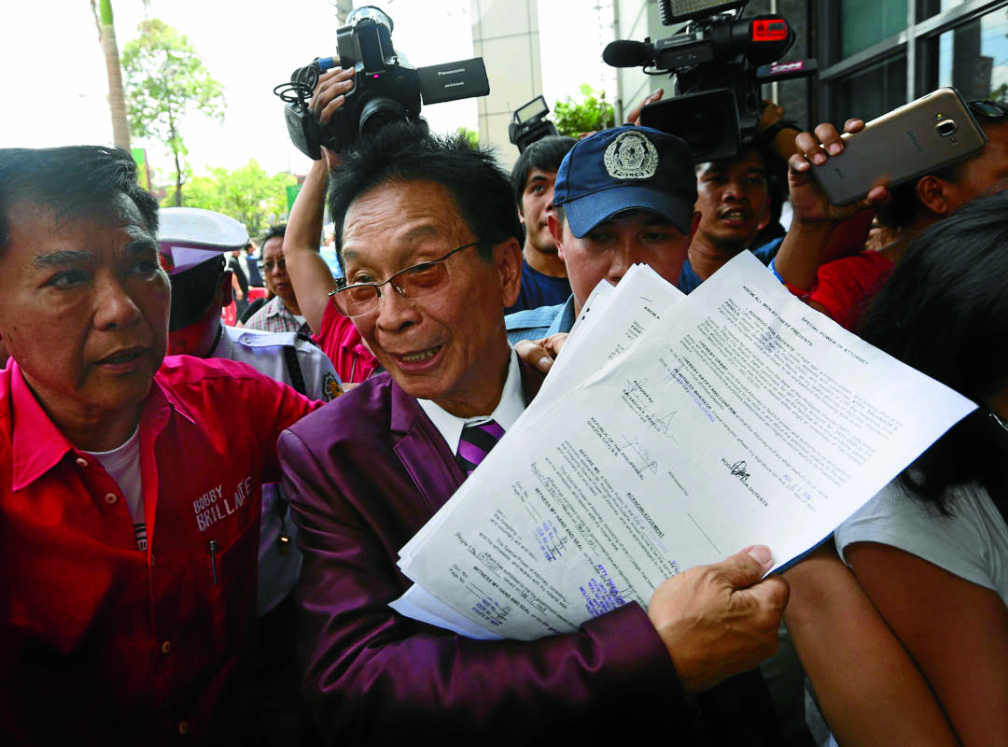DAVAO CITY—The sharp criticisms raised by two United Nations rapporteurs following incoming President Rodrigo Duterte’s remarks about media killings were based on a “wrong premise,” his spokesperson, Salvador Panelo, said on Tuesday.
“The President-elect never said that killing a journalist is justice because of corruption. He was only citing an instance where corruption was (cited) prior to the killing,” Panelo told the Inquirer over the phone.
On Monday, the UN rapporteurs condemned Duterte’s statements suggesting that journalists were not exempt from assassinations if they were corrupt. The UN rapporteurs called on him to stop instigating deadly violence.
They were reacting to the Davao City mayor’s statements during a press briefing last week that some journalists were killed because they committed corruption.
“You won’t be killed if you don’t do anything wrong,” Duterte said, suggesting that victims were partly to blame for their fate.
‘Irresponsible’
Cristof Heyns, UN special rapporteur on summary executions, said the comments “are irresponsible in the extreme and unbecoming of any leader, let alone someone who is to assume the position of the leader of a country that calls itself democratic.”
“A message of this nature amounts to incitement to violence and killing, in a nation already ranked as the second-deadliest country for journalists,” Heyns said in a statement on Monday night.
David Kaye, UN special rapporteur on freedom opinion and expression, said “justifying the killing of journalists on the basis of how they conduct their professional activities can be understood as a permissive signal to potential killers that the murder of journalists is acceptable in certain circumstances and would not be punished.”
“This position is even more disturbing when one considers that the Philippines is still struggling to ensure accountability to notorious cases of violence against journalists, such as the Maguindanao massacre,” Kaye said. He was referring to the killing of 58 people, including 32 media workers, in election-related violence in Maguindanao province in 2009.
Panelo said Duterte actually “abhors violence” and that he would never tolerate the murder of media workers.
Duterte is committed to protect the members of the Fourth Estate, “not only because they are journalists, but because they are citizens of the republic,” according to Panelo.
He said the incoming President’s remarks on media killings, which were aired live by television networks, were not intended to be an endorsement of “deadly violence” as what the UN officials claimed.
“He will never condone any killing. He will prosecute to the fullest under the law any person or group of persons that will kill or injure journalists regardless of the motive of the killers,” Panelo said.
“He is, under the law, bound to protect the citizenry,” Panelo stressed. “Far from it, he does not want violence. That’s precisely why he has entered into peace talks with the communists because he abhors violence. He does not want Filipinos killing fellow Filipinos.”
Bounty killings
Heys and Kaye also raised concern on Duterte’s promise to pay bounties to police and military officials for every drug lord they turn in.
“Talk of ‘dead or alive’ has no role to play in any state that claims to uphold human rights in law enforcement,” Heyns stressed, while recalling the limits imposed by international instruments on the conduct of law enforcement forces.
“Intentional lethal use of force may only be made when strictly unavoidable in order to protect life and not for common policing objectives,” he said.
“The President-elect fools no one when he says he is not calling on people to be killed,” he added.
Duterte had said the use of violence was allowed by law since the “lives of police officials effecting the arrest would be in danger.”
On his plan to offer cash rewards to private citizens who would arrest or kill drug lords, Panelo said the law allowed such a policy under the concept of citizen’s arrest.
Following Duterte’s remarks about media killings, the Paris-based Reporters Without Borders called for a boycott of his press conferences. None among the media organizations in the Philippines responded, however.
“You don’t threaten me with a boycott. Go ahead, boycott me. You really don’t know me,” Duterte said in his speech at the thanksgiving party at Crocodile Park in Davao City on Saturday.
His assistant, Christopher “Bong” Go, said press conferences with the President-elect would no longer be held to avoid mistakes.
Interviews and statements would be coursed through the People’s Television (PTV4) network, he said. With reports from Estrella Torres and Nico Alconaba, Inquirer Mindanao
